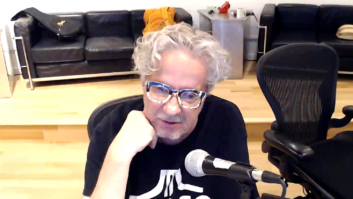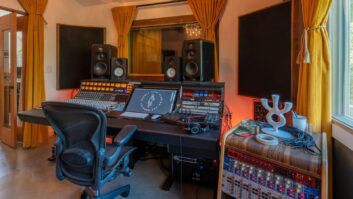Okay, one of the basic tenets of rock writing is that you give your subject the benefit of the doubt — you let him or her present the latest hype without any biased, cynical, rock crit judgment getting in the way. You know, you let the artist say, “This is my best album ever because…” even if you know every person on the planet will disagree. That’s courtesy and respect. But talking with Mark Mothersbaugh — the once and future mastermind of Devo, currently enjoying a second career as a television and film composer — you have to suspend disbelief even more than with most musicians, ’cause he’s always got some tall tale he’s trying to lay on the poor, unsuspecting press. Just look at the blarney he and his principal partner in De-evolution, Gerald Casale, used to unload endlessly on music journalists, year after year. We’re talking very creative and entertaining fiction.
So here he is, sitting in his L.A. studio — Mutato Musika — promoting an extremely twisted surf music CD he made with two of his old Devo-mates, brother Bob Mothersbaugh (the artist formerly known as Bob One) and Robert Casale (Bob Two), and drummer Josh Mancell; known collectively as The Wipeouters. Inside the CD booklet, there’s a hilarious, possibly doctored photo of the guys in the band looking like geeky 13-year-olds in about 1964, because, you see, Mothersbaugh’s story this time around is that these four guys actually played as The Wipeouters in their pre-Devo days in lovely Akron, Ohio, and this CD is sort of a reunion for them. Oh, riiiiight. The Akron surf sound. But don’t use that skeptical tone of voice around Mark Mothersbaugh, because he’s not giving an inch. It’s his story and he’s stickin’ to it!
“The Wipeouters CD was kind of a by-product of another project,” he says. “I got asked to write the theme song for a TV series called Rocket Power [a very cool cartoon on the Nickelodeon network]. So when they sent us some tapes and storyboards of what they were doing, I thought, ‘Wow, this goes all the way back to the Dark Ages of pre-Devo Ohio.’ These [Wipeouters] songs were all written when we were in junior high. It was just a fun thing before any of us were really serious about music. Then, after we did the Rocket Power theme song [all 46 seconds of which is included on the disc], we went back and mined that territory. It was fun enough that we all sat down and found out that we still knew all these songs we used to do. And now we actually know how to tune our guitars!”
He’s just warming up, folks. “Years ago, when we first heard this stuff they called West Coast surf music, we were a bit disappointed, because so much of it sounded like a barber shop quartet with some simpy rock music in the background,” he continues. “The Beach Boys, Jan & Dean… We were repulsed!”
I innocently ask whether he used to surf the flaming Cuyahoga River. “Surfing was a much more visceral experience for us than it was for people in California,” he says seriously. “When we came out here with Devo, in about 1977, Bob One and Bob Two went out to Malibu to check out the surfing and they came back to where we were staying totally in shock. I said to them, ‘What’s the story?’ They said, ‘They cheat.’ I said, ‘What do you mean?’ They said, ‘Well, they use boards.’ You see, when we surfed in Ohio, it was a totally different thing, and the music we were writing was actually a celebration of the experience of the way we used to surf. We were in seventh and eighth grade at the time and pretty skinny. We were often the brunt of the wrath of older, sadistic subhumans that coexisted in the same space as us. Our first experience with surfing came from being shoved in the trunks of the cars of these older goons who would get drunk as they drove from Akron to Lake Erie, and then they’d open the trunk, pull us out and skip us like stones across the surface of Lake Erie. You’d get eight or nine skips before you’d sink. And after a while you learned how to direct your path a bit through the water to avoid rocks and bouys. So then we celebrated that on our Galante guitars in The Wipeouters…”
You gotta admit the guy spins a good yarn. And the fact is, The Wipeouters’ CD, called P’twaaang!!!, is a nifty piece of neo-surf music, mostly instrumental in the tradition of The Ventures and other early genre pioneers, but unmistakably filtered through Devo sensibilities, which means there’s all sorts of interesting sonic weirdness and funny stuff going on; about what you’d expect from the Devo crowd. Some of it is rip-it-up surf ‘n’ roll, other tunes sound like they were pulled from the soundtrack of a really stoopid ’60s surf flick. And, yes, a lot of it sounds like good Devo. You gotta love a disc with titles like “Dangerdog,” “Surf’s Up On Goon Island,” “Wedgie Wipeout,” “Ravin’ Surf” and “Wounded Surfer.” You can almost see the tiki lights!
“We think there will be imitators,” Mothersbaugh says. “Now, the music that was written first is coming out at last!” His story out of the way, he finally drops his guard a bit. “For us, it’s like you have music you do as a job and sometimes that’s really satisfying and sometimes it’s just a job. And then you have music you do just for the fun of it, and that’s what The Wipeouters was. There was no more intention put to it than the fun of recording it. And it was a lot of fun. Obviously there’s a lot of MIDI, a lot of sampling and synths on sequences. It was [a] Pro Tools project, so we were doing things like my brother and I would play guitar solos over the entire length of a whole piece and then we’d edit them down afterward and move them around and re-create our guitar solos. Mine needed a lot more work, since he’s a better guitarist than I am. I need all the help I can get from Pro Tools,” he says with a laugh.
The CD was recorded at Mutato Musika, the four-room studio complex that serves as the nerve center for the Devo boys’ various projects. Bob Mothersbaugh has a regular gig scoring the popular Rugrats animated series for Nickelodeon, the original theme for which was written by brother Mark years ago. Bob Casale is the studio’s technical guru and principal engineer — he cut The Wipeouters’ disc, works regularly with Mark and has engineered Devo’s sporadic projects since their fourth album, New Traditionalists. And Mark has established himself as a dependably odd and eccentric composer, with credits in television (various Nickelodeon series, The Chris Isaak Show), interactive games (Crash Bandicoot, etc.) and a variety of feature films, including the two very successful Rugrats movies, Rocky & Bullwinkle and three by Wes Anderson — Bottle Rocket, Rush-more and the forthcoming Royal Tannenbaums.
Devo was one of the most visually oriented bands to come out of the ’70s new wave, so it’s not surprising that they’ve all embraced film and television to such a large degree. (Gerald Casale is even a successful director.) And Devo’s music always had that bright cartoonish edge to it that made Mark Mothersbaugh’s transition into scoring children’s television seem completely natural. He started as one of a number of hip guys doing music for the late, great Pee-wee’s Playhouse, and that job helped him land the gig working on the early Rugrats cartoons for Nickelodeon. “Plus,” he adds, “Gabor Csupo, who was one of the creators of Rugrats and a big avant-garde music fan, found this odd electronic record I’d recorded — this solo album that came out in Japan called Music for Insomniacs. I was just writing music to do stuff around the house to, and he said it would be good for children [he affects an indeterminate foreign accent] ‘because it’s simple and very childish, Mark.’ He liked that and so I said, ‘Let me create something new in that style.’ So I created a music universe for Rugrats. Then, when I finally met the president and VP of Nickelodeon, it turns out they had been fans of Devo when they were in college.”
When I mention that a lot of his early cartoon music sounded like both music and effects at once, Mothersbaugh agrees and then adds, “It has a lot to do with the background it came from and with the technology that was available for working on TV shows. The budgets haven’t been there for orchestras or large ensembles. And in the process of the bean counters squeezing budgets downward so the creative people are getting less of a piece of the pie than ever before… well, MIDI became something they were very interested in and supported. So I was always looking for sounds that were more interesting than crappy samples, and to do that you had to go a bit into sound effects. Coming from Devo, we were always looking for different sound palettes to work with so we weren’t locked into cliches of what a piece of music is supposed to sound like. We were big fans of people like Perry Kingsley and Spike Jones — the Pee-wee’s Playhouse theme song was, in a way, inspired by Spike Jones.”
Though Devo continues to rear its head periodically — there were Lollapalooza appearances a few years back, a tour opening for Beck a little over a year ago and various albums in their catalog, especially Greatest Hits, continue to win new converts — Mothersbaugh clearly views his film, TV and game work as his primary career right now, and the other band-members seem content with a life spent more out of the public eye. “The trajectory of our career here has changed its course over the past 10 years,” he notes. “It goes through different phases. Although I enjoy touring, and the guys in the band enjoyed touring at one time, it’s kind of like we’ve moved into another part of our lives. For me, the past three years has been making up for the schooling I lacked in orchestral arrangements. I did it by scoring three films in a row with 100-piece orchestras and working with orchestrators and arrangers who taught me how to get over my fear of orchestras.”
In many ways, it’s remarkable that the Devo team has stayed together to the degree that it has, much less thrived as independents under the Mutato umbrella and managed to keep Devo’s name relatively untarnished all these years. It helps that they were friends who were underdogs who made it against all odds. It helped, too, that they were family, literally and figuratively. As Mothersbaugh says, “Devo was two sets of brothers and we were used to collaborating. I still love collaborating. That’s one of the big payoffs for me. I like working with the guys [from Devo] and I like working outside the group, too. And it’s even more interesting to collaborate with someone who’s working in a different field than music, because you can help them out so much. It’s very satisfying to be doing music for features because you’re the last thing in line — music. They’ve finished the whole thing and then they get to you. They’re seeing their movie finished for the first time when they’re in there with you, and there’s something about that that’s exciting.”
No matter how successful a film composer Mothersbaugh becomes, one senses there will always be some time for Devo in one corner of his life. There’s serious talk of releasing their pioneering videos from the ’70s and ’80s on DVD; in fact, I’d say it’s long overdue. And the group’s songs continue to turn up in the strangest places: Anyone who owns a television has no doubt seen the ad campaign by Target stores that uses “It’s a Beautiful World” as its theme song. Evidently, the company doesn’t understand that Devo meant the song ironically. The video was a scathing indictment of Western civilization. “Yeah, that’s true,” Mothersbaugh says with a laugh. “What can I say? Irony is foreign to some people.” Stupid, devolved corporate mutants! Oh well — Booji Boy is laughing all the way to the bank.







